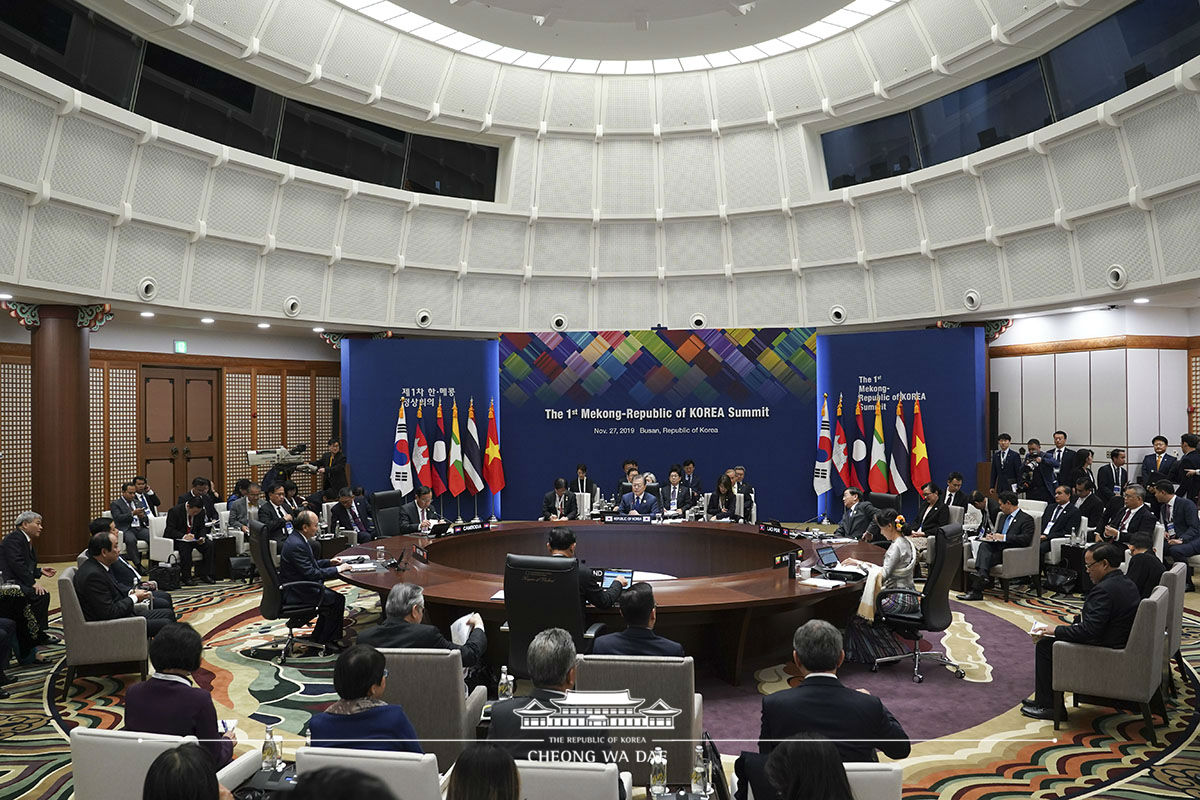이 웹사이트는 제19대 대통령 임기 종료에 따라 대통령기록관이 「대통령기록물 관리에 관한 법률」에 의해 이관받아 서비스하는 대통령기록물입니다. 자료의 열람만 가능하며 수정 · 추가 · 삭제는 불가능합니다.
다만, 「개인정보보호법」에 의하여 개인의 정보를 보호받기 원하시는 분은 관련 내용(요청자, 요청내용, 연락처, 글위치)을 대통령 웹기록물 담당자(044-211-2253)에게 요청해 주시면 신속히 검토하여 조치해 드리겠습니다. 감사합니다.
SPEECHES & REMARKS
BRIEFINGS

I get to see the Mekong countries’ leaders on many occasions, and that makes me feel especially glad. Now, let me declare the start of the historic 1st Mekong-Republic of Korea Summit.
Honorable leaders of the Mekong countries,
I am very pleased that Mekong-ROK Summit is being held in this year for the first time that marks the 30th anniversary of the establishment of ASEAN-ROK dialogue relations.
I am grateful to Prime Minister Prayut for assuming the role of Co-Chair of the Mekong-ROK Summit. I also extend my deep appreciation to Prime Minister Hun Sen, who had proposed the hosting of this summit but could not join us here, and to all the participating leaders gathered today.
The Mekong is the great mother of rivers. It enables human beings to live harmoniously with countless species. The river grows rice while flowing into Cambodia’s Tonle Sap Lake and Viet Nam’s Mekong Delta, and it also generates hydroelectric power in Laos. From ancient times, the Mekong countries have embraced everything and lived harmoniously together like the river itself.
The Mekong countries have now become lands of opportunity. Mekong-based cooperation, which began in the 1980s in line with the market-opening trend, is changing everyday lives by the day. Korea has pursued common prosperity on the continent and ocean as a bridging state, and its dreams were fused to the dynamism of Mekong countries long ago.
In the course of preparing for the Asia-Pacific era, the Republic of Korea has forged a relationship of mutual prosperity with ASEAN and has now become a special friend of the Mekong countries.
The dream of ASEAN and Mekong countries to develop as a united community by narrowing development gaps between member states is the dream of the Republic of Korea.
Trade volume between Korea and the Mekong countries stood at US$84.5 billion last year, a 2.4-fold increase in eight years, while investment grew 1.7 times to reach US$3.8 billion. People-to-people exchanges also approximately tripled to seven million. Mekong countries have become Korea’s key development cooperation partners, receiving more than 20 percent of official development assistance funds.
With the adoption of the Han River Declaration in 2011, cooperation has been expanded to a wide range of areas, including water resources management, ICT and energy. With the formation of the Mekong-ROK Cooperation Fund and yearly meetings of the Mekong-ROK Business Forum, our cooperation is deepening all the more.
While the Mekong countries have achieved a high annual growth of over 6 percent, they have managed sustainable development by establishing a harmony between humankind and nature and have formed a new order through the Asian spirit of sharing and mutual respect.
The Mekong region was the center of civilization connecting the civilizations of the Yellow River and Indus Valley. The pride of Angkor Wat, Bagan and Vat Phou and the revival of the Ayutthaya and Champa kingdoms’ legacy of maritime trade are heralding a new era of prosperity.
When Korea’s experience is coupled with the dynamism of the Mekong region, the Miracle on the Hangang River will lead to the Miracle on the Mekong. Korea will stand with the Mekong region in the belief that the development of the Mekong countries is that of Korea.
Thank you.
Next, I would like to ask Prime Minister Prayut of Thailand, the Chair of ASEAN this year and Co-Chair of the Mekong-ROK Summit, to give his opening remarks.



